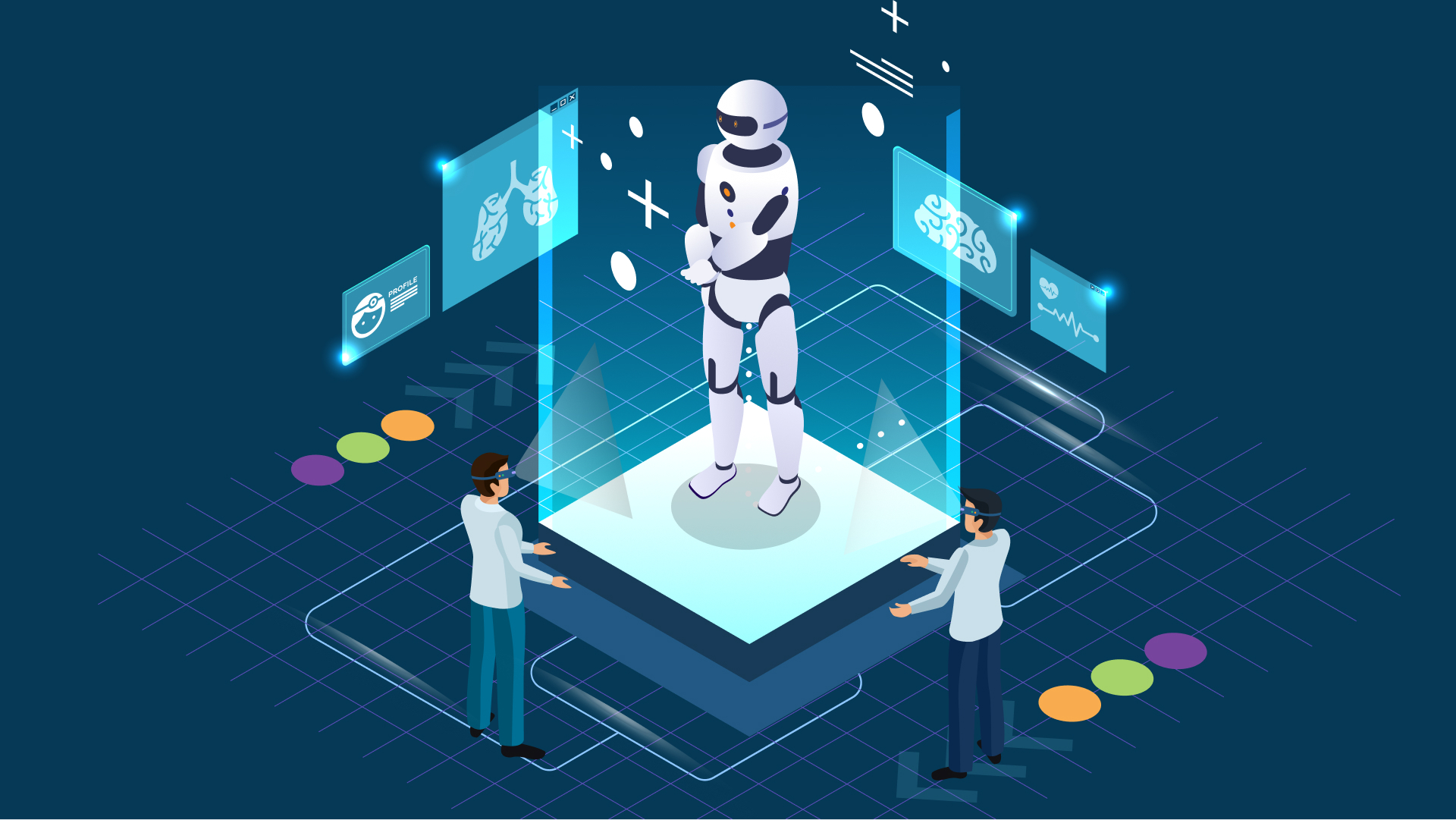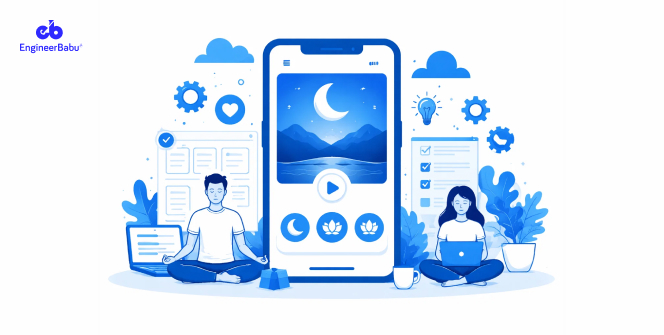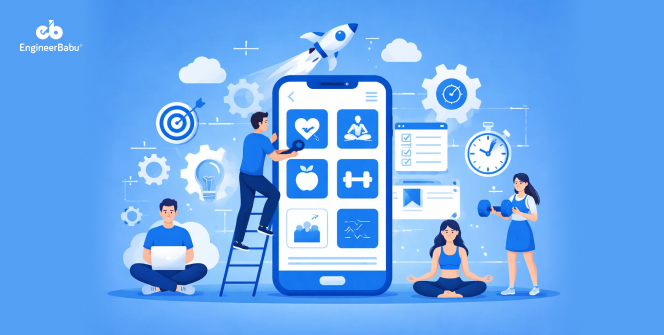What if your health app could spot a stroke risk before symptoms hit? Or save your staff hours every week by filling out clinical notes on its own?
Welcome to the age of AI-powered healthcare apps—where smart technology is doing way more than counting steps. These apps are becoming quiet powerhouses behind the scenes: reducing burnout, catching early warning signs, and delivering personalized care without adding to the workload.
However, not all AI health apps are created equal.
If you’re wondering what features actually make a difference in your healthcare app —this post breaks down the seven capabilities your next app has to include if you want it to be more than just another icon on your patients’ phones.
Must Have Features of an AI-powered Healthcare App
Smart Scheduling That Prevents Burnout and No-Shows
Manual scheduling is a time sink. Front desk teams juggle provider calendars, patient preferences, and last-minute cancellations—all while trying to avoid double bookings and no-shows. It’s inefficient, frustrating, and often leads to gaps in care or wasted clinical hours.
The AI-Powered Solution:
Smart scheduling uses machine learning to analyze provider availability, appointment types, patient history, and even past behavior (like no-show patterns). It can automatically offer optimal slots, adjust schedules dynamically, and even send personalized reminders to reduce no-show rates.
Example:
Zocdoc’s Smart Scheduler uses AI to match patients with the right provider at the right time, filling open slots instantly and minimizing downtime. Clinics using AI-powered scheduling have seen a 20% drop in no-shows.
Predictive Risk Assessment That Spots Trouble Before It Starts
Healthcare providers often struggle to identify patients at risk of developing chronic conditions before symptoms manifest. This reactive approach can lead to delayed interventions, higher treatment costs, and poorer patient outcomes.
The AI-Powered Solution:
AI algorithms can analyze vast amounts of patient data, including medical history, lifestyle factors, and genetic information, to predict the likelihood of developing conditions like diabetes or cardiovascular diseases. This enables proactive interventions, personalized monitoring, and timely lifestyle modifications to prevent disease progression.
Example:
The NHS in England is trialing an AI tool capable of predicting the risk of type 2 diabetes up to 13 years before onset by analyzing routine heart scan data. This early detection allows for preventive measures to be implemented well in advance.
Personalized Treatment Plans That Actually Fit the Patient
Standardized treatment protocols may not account for individual patient differences, leading to suboptimal outcomes and unnecessary side effects.
The AI-Powered Solution:
AI can develop personalized treatment plans by analyzing individual characteristics such as genetics, medical history, and lifestyle factors. This customization ensures that therapies are tailored to each patient’s unique needs, improving efficacy and reducing adverse effects.
Example:
Artera’s Multimodal Artificial Intelligence platform uses AI to create customized treatment plans for prostate cancer patients by analyzing a vast dataset of patient records and biopsy images. This approach balances effective treatment with minimizing unnecessary side effects.
Automation of Routine Tasks
Healthcare professionals spend a significant portion of their time on administrative tasks such as data entry, appointment scheduling, and documentation, reducing the time available for direct patient care.
The AI-Powered Solution:
AI can automate these routine tasks, streamlining workflows and allowing healthcare providers to focus more on patient interactions. This includes automating appointment scheduling, managing electronic health records, and generating clinical documentation.
Example:
Cera Care has developed an AI Scheduler that reduces administrative time by up to 80% and travel time by up to 50%, freeing staff to deliver additional care and improving overall efficiency.
Remote Medical Assistance That Reaches Patients Anywhere
Patients in remote or underserved areas often face challenges accessing timely medical care, leading to delayed diagnoses and treatments.
The AI-Powered Solution:
AI-powered health apps can provide virtual consultations, symptom assessments, and health monitoring, enabling patients to receive medical assistance without the need for in-person visits. This improves access to care and allows for continuous health monitoring.
Example:
In Scotland, an AI-powered physiotherapist named Kirsty allows patients to book same-day appointments via a phone app, providing personalized exercise routines and pain management advice, thereby reducing waiting times for traditional physiotherapy services.
Advanced Diagnostic Support
Accurate and timely diagnosis is critical in healthcare, but human error and the sheer volume of data can lead to misdiagnoses or delayed diagnoses.
The AI-Powered Solution:
AI can assist in diagnosing diseases by analyzing medical images, lab results, and patient data, identifying patterns that may be missed by the human eye. This support enhances diagnostic accuracy and speeds up the diagnostic process.
Example:
At University Health’s Breast Center in San Antonio, AI aids radiologists by identifying potential cancerous areas in mammograms, enhancing diagnostic accuracy and allowing for earlier interventions.
Predictive Analytics for Proactive Care
Healthcare systems often operate reactively, addressing health issues after they arise rather than preventing them, leading to higher costs and poorer patient outcomes.
The AI-Powered Solution:
Predictive analytics uses AI to analyze patient data and predict future health events, enabling proactive care strategies. This includes forecasting disease outbreaks, anticipating patient deterioration, and identifying individuals at high risk of hospitalization.
Example:
Cera Care’s Hospitalisation Predict-Prevent tool forecasts more than 80% of health risks in advance, reducing hospitalizations by up to 70% by enabling early interventions and proactive care management.
Build a Custom AI-Powered Healthcare App
Off-the-shelf apps can get you part of the way. But if your workflows are complex, your patient population has unique needs, or you’re planning to scale—a custom AI-powered app might be the smarter path.
Why build custom?
- Tailored to your exact workflows: Whether you’re a multi-specialty hospital or a solo practice, custom development means the app fits your operations—not the other way around.
- HIPAA and compliance built-in: A custom app gives you more control over how data is stored, transmitted, and accessed—critical for passing audits and maintaining patient trust.
- Integration-ready: Connect directly to your existing EHRs, billing systems, RPM devices, or even internal analytics dashboards without depending on third-party plug-ins.
- Scalable and future-proof: You can start with core features—like smart scheduling or remote monitoring—and expand into predictive analytics or generative AI features later.
If you’re serious about using AI to drive real change—not just automate a few tasks—building a custom healthcare app gives you control, flexibility, and long-term ROI. A trusted app development company can help you develop a scalable healthcare app that meets your requirements.
Conclusion
From smart scheduling that reduces no-shows to predictive analytics that help prevent avoidable hospitalizations, AI features are reshaping how care is delivered—making it more efficient, personalized, and proactive.
These tools aren’t designed to replace clinicians, but to amplify their expertise, free up their time, and support better decision-making with real-time insights.
Healthcare systems that adopt these features are seeing tangible results: improved patient engagement, lower operational friction, and better clinical outcomes. But success with AI doesn’t come from just downloading the latest app.
It comes from choosing or building apps that are grounded in healthcare workflows, compliant with privacy laws like HIPAA, and focused on real problems—not flashy tech.
FAQs
Are AI-powered health apps safe and HIPAA-compliant?
Yes—if built correctly. Reputable apps use secure data encryption, strict access controls, and follow HIPAA regulations to ensure patient data is protected. Always verify compliance before adoption.
How much training is required to use these apps in clinical settings?
Most AI-powered apps for healthcare are designed with clinicians in mind. They often integrate directly into existing workflows and EHR systems, requiring minimal training after onboarding.
Can small clinics or private practices benefit from AI apps?
Absolutely. Many AI features like scheduling automation or documentation support can save time and reduce costs even in smaller settings. Cloud-based apps also make adoption affordable.
What’s the biggest barrier to adopting AI in healthcare apps?
The top challenges include data privacy concerns, system integration issues, and internal resistance to change. Choosing trusted tools, piloting them with small teams, and showing results can help build buy-in.
Can Engineerbabu build AI-powered healthcare apps?
Engineerbabu is a trusted IT services partner with a proven track record in building high-quality healthcare applications. Our development teams understand the strict compliance requirements, workflow complexities, and patient-centric design standards needed in healthcare. We help healthcare providers and startups overcome technical barriers and build solutions that scale—with privacy and performance built-in from day one.



